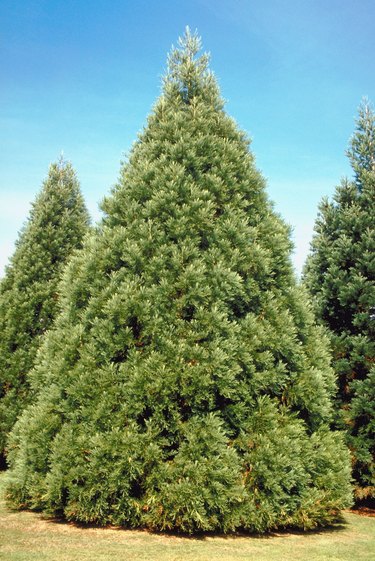
Evergreens are plants that don't lose their leaves all at once, but a little at a time. some evergreens have needles and are called conifers, while others have leaves and are called broadleaf evergreens. Deep-rooted trees may have several deep, anchoring roots, or one long taproot, a deeply penetrating root that grows straight down from the trunk.
Firs
Video of the Day
True firs are from the Abies genus. Grand firs (Abies grandis), hardy in U.S. Department of Agriculture plant hardiness zones 4 through 9, are known for their aromatic, rich green foliage. They can reach 260 feet tall. Fraser firs (Abies fraseri), hardy in USDA zones 4 through 7, bear upright, stiff needles and can get to about 50 feet tall. Both grow extensive, deep root systems. The Douglas fir (Pseudotsuga menziesii), hardy in USDA zones 5a through 6b, isn't a true fir, although it's similar in appearance. It can reach heights of 300 feet and bears deep root systems.
Video of the Day
Spruce and Pine
Colorado blue spruce (Picea pungens "Glauca") and Norway spruce (Picea abies) are both hardy in USDA zones 3 through 6 and have deep root systems. The Colorado blue spruce bears attractive blue-green foliage and can reach 100 feet, while the Norway spruce bears shorter, green needles and can reach 150 feet. Longleaf pine (Pinus palustirs), hardy in USDA zones 7 through 10a, gets to about 115 feet tall and has a deep taproot. Specimens have remained upright during hurricanes.
Cedars
The atlas cedar (Cedrus atlantica "Glauca"), hardy in USDA zones 6 through 8, grows to 40 feet tall. It bears blue-green needles in starry clusters along the branches, and it has deep roots, making it wind-tolerant. The cedar of Lebanon (Cedrus libani), hardy in USDA zones 6a to 9b, bears medium-green foliage and can reach 75 feet, while deodar cedars (Cedrus deodara) look similar but reach about 50 feet and are less stiff in form than the cedars of Lebanon. Both have deep roots that help them resist drought damage.
Broadleaf Evergreens
Not all evergreens bear needle-like foliage. The Pacific madrone (Arbutus menziesii), hardy in USDA zone 7 through 9, bears leathery green leaves and attractive peeling bark. It can reach 75 feet and grows a deep taproot. Southern magnolias (Magnolia grandiflora), hardy in USDA zones 6 through 10, can reach up to 80 feet tall and bear large, glossy evergreen foliage. They produce large, waxy white flowers and large taproots.
- Sound Native Plants: Trees and Shrubs
- Nurserymen.com: Evergreen Tree Buyer's Guide
- Redwood Barn Nursery: Evergreen Trees for Our Area!
- United States Department of Agriculture: Abies
- Forest Service Department of Agriculture: Manage to Reduce Hurricane Damage
- Lawyer Nursery: The Grand Fir
- Missouri Botanical Gardens: Abies Fraseri
- University of Florida: Pseudotsuga Menziesii
- Forest Service Department of Agriculture: Pinus Palustris
- School of Forest Resources and Conservation: The Pine Family
- Frames: Tall Timbers E.V. Komarek Fire Ecology Database
- Easy Bloom: Cedar of Lebanon
- Hua Gui Trees: Cedrus Deodara
- Floridata: Arbutus Menziesii
- Arbor Day Foundation: Magnolia, Southern
- USDA Forest Service: Southern Magnolia